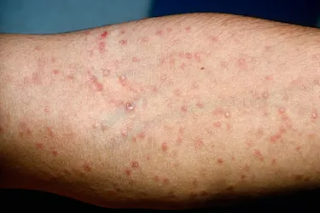Understanding Syphilis in Women: Symptoms, Risks, and Treatment
 |
| Syphilis in Women |
Syphilis, a sexually transmitted infection (STI) caused by the bacterium Treponema pallidum, can affect individuals of all genders, including women. Despite being curable with antibiotics, syphilis remains a significant public health concern due to its potential complications if left untreated. In this article, we delve into the nuances of syphilis in women, including its symptoms, risks, and available treatment options.
Symptoms of Syphilis in Women
Syphilis progresses through various stages, each characterized by distinct symptoms:
1) Primary Stage: The primary stage typically begins with the appearance of a painless sore (chancre) at the site of infection, often on the genitals, anus, or mouth. These sores may go unnoticed, leading to delayed diagnosis.
2) Secondary Stage: If left untreated, syphilis progresses to the secondary stage, marked by symptoms such as rash, fever, swollen lymph nodes, sore throat, and flu-like symptoms. These manifestations can mimic other conditions, making diagnosis challenging.
3) Latent Stage: Without treatment, syphilis enters a latent stage, during which no symptoms are present. However, the infection remains in the body and can progress to the tertiary stage if left untreated.
4) Tertiary Stage: Tertiary syphilis can lead to severe complications, including damage to the heart, brain, nerves, eyes, bones, and other organs. This stage can be life-threatening and may cause irreversible damage if not treated promptly.
Risks and Complications
Women are particularly vulnerable to the complications of untreated syphilis, which can include:
1) Congenital Syphilis: Pregnant women with untreated syphilis can transmit the infection to their unborn babies, leading to congenital syphilis. This can result in stillbirth, premature birth, low birth weight, developmental delays, and other serious health problems in infants.
2) Neurological Complications: Syphilis can affect the nervous system, leading to neurological complications such as meningitis, stroke, and dementia.
3) Cardiovascular Complications: Untreated syphilis can damage the heart and blood vessels, increasing the risk of conditions such as aortic aneurysm and heart valve disease.
Treatment and Prevention
Early detection and treatment of syphilis are crucial for preventing complications and reducing the spread of infection. Syphilis is typically treated with antibiotics, most commonly penicillin. Regular testing for syphilis and practicing safe sex can help prevent transmission of the infection.
Conclusion
Syphilis in women presents unique challenges, from accurate diagnosis to preventing complications in pregnant individuals and their babies. Increased awareness, regular testing, and timely treatment are essential for controlling the spread of syphilis and minimizing its impact on women's health and well-being. By prioritizing sexual health and seeking medical care when needed, women can protect themselves and their loved ones from the consequences of syphilis infection.


Comments
Post a Comment